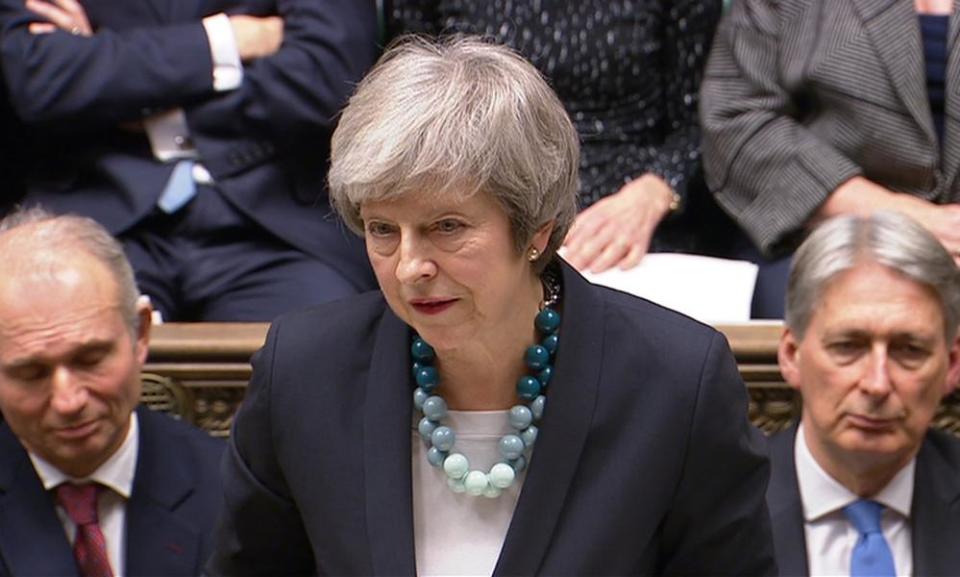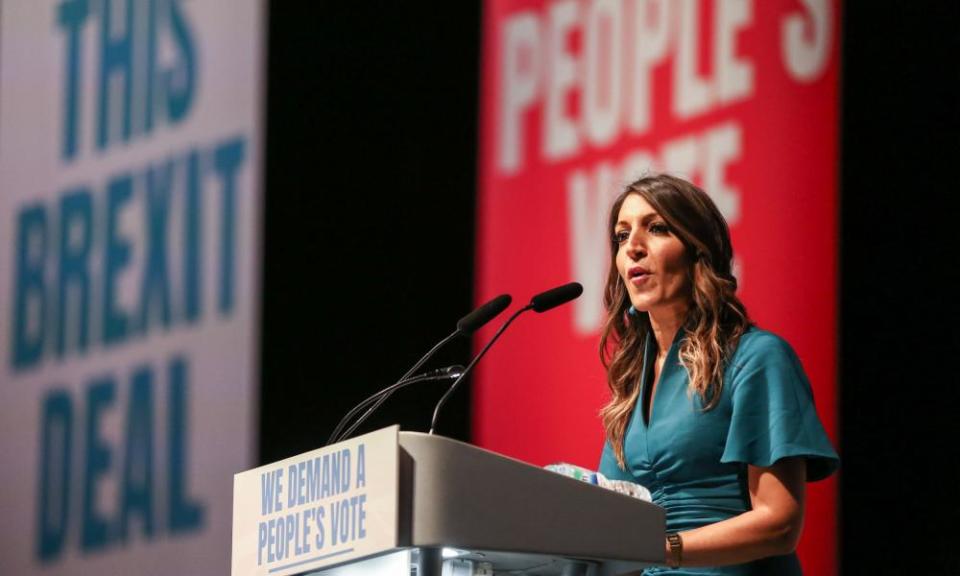Brexit is a failed project. Labour must oppose it

Sometimes, in politics, you just have to fight for what you believe in. I believe that – amid the current geopolitical meltdown – staying in the European Union and reforming it is safer than casting ourselves adrift with a bunch of rightwing Tory xenophobes at the helm.
But since the referendum, I’ve understood that a leftwing Labour government can only be achieved by building a coalition of voters across the Brexit divide. It’s a belief based on the experience of the 2017 general election, when I campaigned in solidly working-class areas where, to keep a doorstep conversation going for more than 30 seconds, the first sentence had to be: “We will deliver Brexit.”
However, the voters chose Theresa May to deliver Brexit, and it is she who has to take responsibility for the catastrophe that’s unfolded. As she heads for Brussels, and further fruitless days of negotiatons, those who supported Brexit have to face the fact: there is no form of possible Brexit that you are going to like.
May’s negotiating strategy handed all the power to Europe; she knew the deal would be unsellable to her own voters, so she delayed revealing it until last summer, when – as predicted – it split the cabinet and paralysed the government.
If we ever get to the point where the prime minister summons the courage to stage a vote on the deal, I want Labour to vote it down and then use every possible parliamentary tactic to bring down this government. That could include a no-confidence vote, a censure against May herself or – if the votes are there – a minority government headed by Jeremy Corbyn.
May had one job – to do a Brexit deal and get it through the Commons. Once she fails there is no workable combination of Tory plus DUP votes that can keep the show on the road. So what next? For as long as the referendum result remained valid, Labour was right to try to deliver a form of Brexit that mitigates the economic risks and keeps us geopolitically close to the EU. It would have been electoral suicide for Labour to have become the “remain party” – and would have needlessly polarised the politics along the lines of a culture war, as Trump has done in the US.
But once May’s deal is rejected in parliament, that period should come to an end. The Labour party’s front bench needs to face the fact that – through no fault of its own – the space for a bespoke “soft” Brexit, keeping Britain inside the customs union and close to the single market, is shrinking rapidly.
The only form of softer Brexit available is likely to be the one called Norway-plus, as advocated by both Tory and Labour backbenchers. It means joining the customs union, staying in the single market and applying an “emergency brake” to free movement. Though not ideal, it is a solution that could achieve what so many voters in hard-pressed towns want: to sort the Brexit issue, give us a modicum of control over migration policy, and move on. I would back it, if it were enacted by a temporary coalition of Labour and the nationalist parties. But the numbers don’t seem to be there in parliament and I expect it to fail.

So what is Labour’s fallback? Should it be, as John McDonnell and Keir Starmer have intimated, a second referendum with the party campaigning for remain? Or should it conduct a rearguard action on behalf of the June 2016 referendum majority, in an attempt to get a soft Brexit deal that can unite the population? It’s a challenge that hinges on a question that many in Corbyn’s Labour party don’t want to answer: who does Labour really represent?
Since 2014 it’s been clear that the tribal alliance that used to put Labour into power is pulling in different ways. Traditionally this included the working-class towns of England, the inhabitants of Great Britain’s largest cities and the wider population of Scotland and Wales plus – to seal the deal – the suburban middle-class swing voter. Once a majority of young, educated Scots had swung behind the independence project, and the Scottish radical left joined them, the old tribal alliance began to fall apart.
Meanwhile a cultural divide has opened up: the cities, the university-educated, the public-sector employees and the professional middle class are more socially liberal, more globalist, more supportive of a migration than before. But in small towns, and among those with low skills and low incomes, the cultural pull is in the opposite direction.
Finally, the middle-class swing voter just wants all the chaos and fractiousness to go away. If Labour had remained a hollow shell, bereft of a vibrant intellectual life and mass involvement, the problem would be less acute – the manias and enthusiasms currently energising grassroots politics would, in Ed Miliband’s day, have been filtered through layers of dull technocracy.
But hundreds of thousands of people have flocked to Corbyn’s project – and it is important to recognise that they come both from working-class towns and university cities; from the manual working class and the educated salariat.
What unites most of them – including, I stress here, those from working-class communities – is a globalist and socially liberal attitude to life, the desire for a radical programme of redistribution and investment in, and support for, human rights. In the industrial town where I grew up, the labour movement was always a line drawn through the working class, in favour of values: social justice, tolerance and solidarity. There were always people on the other side, though they used to vote Tory rather than Ukip.
The answer to “who does Labour really represent?” should be a no-brainer. It represents people who are prepared to put evidence before prejudice, fight for social justice, save globalisation by doing less of it – and who are not prepared to throw their black, brown and eastern European colleagues under the bus of xenophobia. It represents women not misogynists, internationalists not nationalists.
Nobody knows that better than the Labour activists who – in the pubs, clubs and high-street stalls of small-town Britain – have to argue face to face with racists and Little Englanders, week in, week out. I know, from talking to my friends among them, that they do not look forward to a second referendum campaign. Even if the numbers supporting leave are falling, their anger is getting stronger as their dreams evaporate.
But I have met hardly anyone inside the Labour party who wants to go into the next election supporting Brexit. Anecdotally, among Labour branches who’ve been loyal to Corbyn, and among Momentum members, I find tolerance for that line at breaking point. Because, as designed and managed by its backers, the Brexit project has failed. The only possible form of it is something its supporters can’t accept.

So if Labour can’t trigger an election, it should push in parliament for a second referendum and vote remain. But what if an election can be triggered? Given that parliament is sovereign, why should Labour tie itself to a failed project that was the brainchild of its enemies, and in which no significant part of its family believes?
The strategy of letting leave supporters learn by experience was a good one: they have learned that hard Brexit is a fantasy, that Boris Johnson is a coward and that the Tories are a chaotic mess. But this strategy has to be superseded by a struggle over principles and vision. To weather the backlash, Labour needs to fight for the values its members, activists and loyal voters believe in. That does not look like any form of Brexit achievable in the conditions of 2019.
So in a snap election I want Labour to embrace its old position: remain and reform – with the offer of a “final say” referendum once Labour is installed in office. The moral authority of the old result will have evaporated. There are three new cohorts of 18-year-olds who should have their say, a worsening geopolitical situation – and three left governments in Europe we can ally with to replace the Lisbon treaty with something better. I don’t dismiss the fears of some union leaders and north of England MPs over a Brexit backlash; I want to hear them debated openly, just as they were at Labour’s conference. That’s why, if we do get a snap election, like the TSSA union leader Manuel Cortes, I want to see the decision on what’s in Labour’s manifesto taken by an elected body of the Labour party – the NEC, a special conference or the Clause V committee – with a public debate inside the party based on evidence.
Labour’s conference left “all options on the table”, including a second referendum and a remain vote. Nowhere in its conference motion on Brexit did it say a second referendum would be a “betrayal”. That’s the language of our opponents. We should counter it with a narrative of hope.
• Paul Mason is a writer and broadcaster on economics and social justice

 Yahoo News
Yahoo News 
